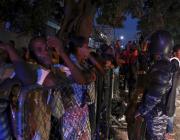Mass deportations in the Dominican Republic
Disenchantment – Argelaga
An essay on political corruption in Spain published in May 2015, its impunity, its roots in the “partiocracy” that emerged from the “Transition”, its penetration of the Judiciary, and the resulting disenchantment of the population—awakened from its apathy regarding such chicanery now that the economic boom that accompanied the construction of the new Spanish State-form has come to an end—which has led to attempts by political opportunists to rehabilitate the party system by forming new, vaguely progressive “civil society” parties and regional separatist movements, rather than recognizing that “corruption is not the exception, but is inscribed in the very nature of the system”.
The civil society plague: the middle class and its discontents – Miguel Amorós
A critical outline of the main features of the civil society or citizens’ movement, understood as a response of the managerial middle class to its ongoing proletarianization in the current crisis; its ideological basis, a “postmodern version of bourgeois radicalism”, its program, “consciously opportunist”, and its ranks filled with “careerist” tyros, it merely aims at a realignment of the party system of capitalism in order to resuscitate capitalist growth by means of an improved administration of the existing system combined with social democratic reforms whose goal is not socialism, but to “save the middle class” and to create jobs for large numbers of unemployed college graduates.
The question of centralisation - Karl Marx
Karl Marx writes on state power and centralisation.
Operation Piñata: We Are the Enemy! – Revista Argelaga
Revista Argelaga examines the broader implications of the recent (March 2015) witch-hunt against anarchists in Spain known as “Operation Piñata” through the lens of the “Criminal Law of the Enemy” (Günther Jakobs), observing that the draconian measures implemented to deal with the domestic “enemy”—the excluded and dissenters, now stigmatized as “terrorists”—are plunging us into a “Kafkaesque universe” ruled by “the logic of fear”, and that we face the threat of the emergence of an inauspicious “totalitarian surveillance and control hysteria among the masses of the citizenry” terrified by the economic crisis and the “Jihadist aberration”.
The Ideology of Progress in Latin America – Revista Argelaga
An essay “written on the occasion of the premier of the documentary film, ‘Asfaltar Bolivia’” [Paving Bolivia] in Barcelona (2015), denouncing the destructive impact of capitalist development and its hypocritical rhetoric of “progress”, “development” and “modernization”, in the context of the recent nationalist upsurge based on extractive industries and a modified form of globalization that has swept over Latin America as the new populist leaders attempt to impose “modern, consumerist, individualist and predatory lifestyles” to create a “social base” so the “extractivist bureaucracy can consolidate its power” at the expense of indigenous communities and “collective ways of life”.
The state and capitalist society - Ralph Miliband
Marxist academic Ralph Miliband's extensive and detailed analysis and critique of the role played by the state in advanced capitalist society. It examines each part of the state, including the government, civil service, legal system and armed forces and their relationships with business, the media, religion and trade unions. Written in 1969, most of the tendencies he points to are even further advanced today, so while there is little mention of race and gender this remains an invaluable text.
Revolution and counterrevolution in Catalonia - Carlos Semprún Maura
First published in France in 1974, a “critical analysis of the bureaucratization of the CNT, with regard to both the political as well as the economic terrain”, bureaucratization which the author claims was “total and complete”, with discussions of certain historical turning points and watershed moments (e.g., the militarization of the militias, the May Events and the overthrow of the Council of Aragon), and extensive passages quoted from eyewitness accounts (e.g., Marcel Ollivier’s Les journées sanglantes de Barcelone), newspaper articles and official documents that have not previously appeared in English translation.
Origins of the police - David Whitehouse
Excellent text examining the creation of the first police forces, which took place in England and the US in just a few decades in the mid-19th century. And explaining that they were not brought into being to prevent crime or protect the public, but primarily to control crowds: the working class, white and black.











 Can comment on articles and discussions
Can comment on articles and discussions